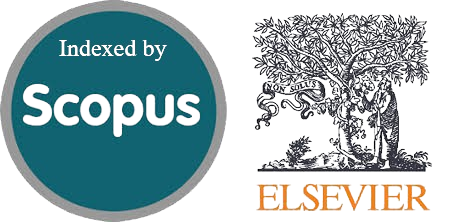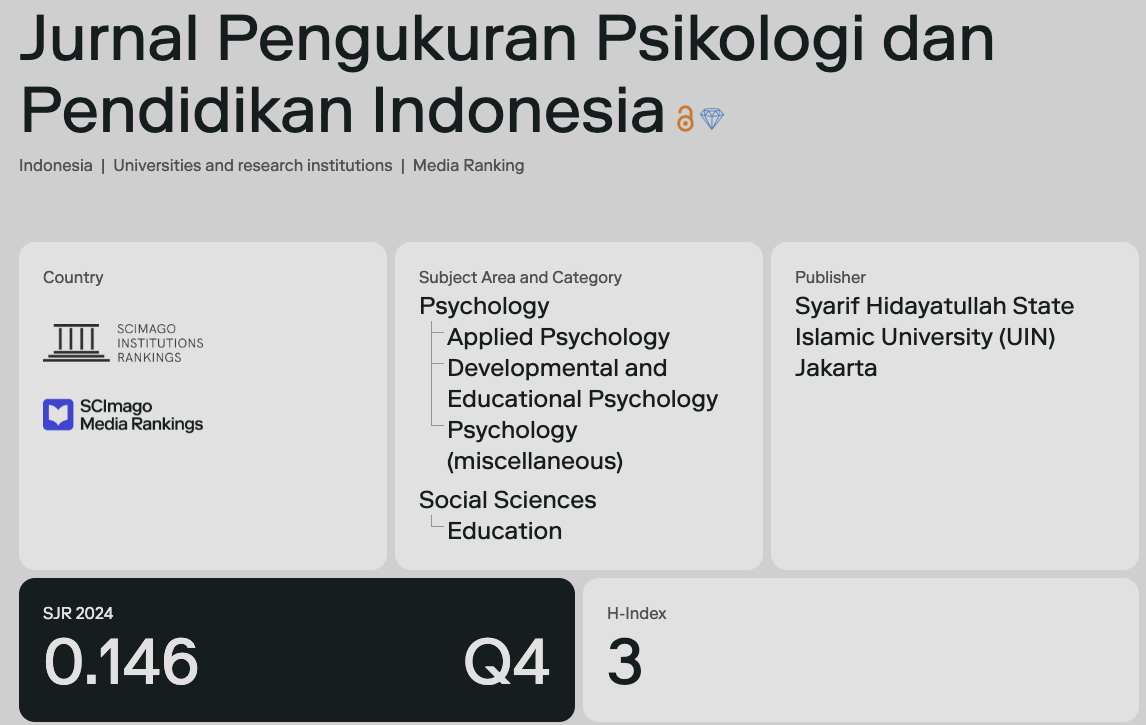Modeling of Colorado Learning Attitude Science Survey in Indonesian Version: A Study with Applying Item Response Theory
DOI:
https://doi.org/10.15408/jp3i.v13i1.36745Keywords:
CLASS Indonesian version, physics education, IRT, polytomous responseAbstract
Colorado Learning Attitudes about Science Survey (CLASS) is an instrument designed to explore students' perceptions of physics and assess how closely their beliefs correspond with those of professional physicists. Before the development of CLASS, several similar instruments were developed in the field of Physics Education such as the Maryland Physics Expectation (MPEX), Views About Science Survey (VASS), and Epistemological Beliefs Assessment for Physical Science (EBAPS). Adams et al. developed CLASS in 2006 by evaluating these three instruments. Since then, CLASS has been extensively studied for its use in research, especially in the field of Physics Education, and has also been applied in other fields and translated into several languages. As a form of community strengthening, this article attempts to report the research findings related to the use of the CLASS instrument that has been translated into Indonesian. A total of 292 undergraduate students were sampled in this study, who are students from four universities. The respondents in this study were students who had enrolled in the Fundamental of Physics course. The data obtained were analysed with Item Response Theory (IRT) for the polytomous scale. There are Grade Response Model (GRM), Partial Credit Model (PCM), Rating Scale Model (RSM), and Generalized Partial Credit Model (GPCM). The research results show that among the four models of approach and based on the criteria used, the model considered most suitable is GRM. The research also shows that the number of items declared consistent with the model does not cover all CLASS items but rather some items. This finding indicates that further exploration is needed regarding the CLASS instrument items, especially in the Indonesian version. The findings of this study also add to the wealth of knowledge related to the quality assessment of the CLASS instrument through the modern test theory approach (IRT). Thus, the CLASS instrument can be regarded as a standard instrument and can be used globally across various populations.References
K. E. Gray, W. K. Adams, C. E. Wieman, and K. K. Perkins, Students know what physicists believe, but they don’t agree: A study using the class survey, Phys. Rev. ST Phys. Educ. Res. 4, 020106 (2008).
Adams, Wendy K., et al. "New instrument for measuring student beliefs about physics and learning physics: The Colorado Learning Attitudes about Science Survey." Physical review special topics-physics education research 2.1 (2006): 010101.
E. F. Redish, J. M. Saul, and R. N. Steinberg, Student expectations in introductory physics, Am. J. Phys. 66, 212 (1998).
I. Halloun, Views about science and physics achievement: The VASS story, AIP Conf. Proc. 399, 605 (1997).
A. Elby, http://www2.physics.umd/edu/~elby/EBAPS/idea.htm
Kontro, Inkeri, and David Buschhüter. "Validity of Colorado Learning Attitudes about Science Survey for a high-achieving, Finnish population." Physical Review Physics Education Research 16. 2. 0201042 (2020).
K. Semsar, J. K. Knight, G. Birol, and M. K. Smith, The Colorado Learning Attitudes about Science Survey (class) for use in biology, CBE Life Sci. Educ. 10, 268 (2011). K. A. Douglas, M. S. Yale, D. E. Bennett, M. P. Haugan,
W. K. Adams, C. E. Wieman, K. K. Perkins, and J. Barbera, Modifying and validating the Colorado Learning Attitudes about Science Survey for use in chemistry, J. Chem. Educ. 85, 1435 (2008).
J. de la Garza and H. Alarcon, Assessing students’ attitudes in a college physics course in Mexico, AIP Conf. Proc. 1289, 129 (2010).
P. Zhang and L. Ding, Large-scale survey of Chinese precollege students’ epistemological beliefs about physics: A progression or a regression?, Phys. Rev. ST Phys. Educ. Res. 9, 010110 (2013).
H. Alhadlaq, F. Alshaya, S. Alabdulkareem, K. K. Perkins, W. K. Adams, and C. E. Wieman, Measuring students beliefs about physics in Saudi Arabia, AIP Conf. Proc. 1179, 69 (2009).
V. Sawtelle, E. Brewe, and L. Kramer, Validation study of the Colorado Learning Attitudes about Science Survey at a hispanic-serving institution, Phys. Rev. ST Phys. Educ. Res. 5, 023101 (2009).
Douglas, K. A., M. S. Yale, D. E. Bennett, M. P. Haugan, and L. A. Bryan. "Evaluation of Colorado Learning Attitudes about Science Survey." Physical Review Special Topics-Physics Education Research 10, no. 2 (2014): 020128.
Martins, Julian S., and William E. Lindsay. "Evaluation of high school student responses to the Colorado learning attitudes about science survey." Physical Review Physics Education Research 18, no. 1 (2022): 010132.
Jahanifar, Mojtaba, and Hojatolah Derafsh. "The Evaluation of Psychometric Characteristics of Persian Version of the Colorado Learning Attitudes about Science Using the Polytomous Item Response Theory Models." Journal of Cognitive Psychology 8, no. 1 (2020): 1-26.
Christman, Elaine, Paul Miller, and John Stewart. "Exploring the CLASS with Item Response Theory." In Proceedings of the Physics Education Research Conference (PERC, pp. 81-86. 2020.
Pathoni, H., W. Kurniawan, Dwi Agus Kurniawan, and R. Perdana. "Motivation and Attitude of Students on Physics Subject in the Middle School in Indonesia." International Education Studies 12, no. 9 (2019): 15-26.
Kurniawan, Dwi Agus, Astalini Astalini, and Deti Kurnia Sari. "An evaluation analysis of students’ attitude towards physics learning at senior high school." Jurnal penelitian dan evaluasi pendidikan 23, no. 1 (2019): 26-35.
Sakliressy, Maura Trynovita, Widha Sunarno, and Fahru Nurosyid. "Students scientific attitude in learning physics using problem based learning model with experimental and project methods." Jurnal Ilmiah Pendidikan Fisika Al-Biruni 10, no. 1 (2021): 59-70.
Hauck Filho, Nelson, Wagner de Lara Machado, and Bruno Figueiredo Damásio. "Effects of statistical models and items difficulties on making trait-level inferences: A simulation study." Psicologia: Reflexão e Crítica 27 (2014): 670-678.
Hynninen, Teemu, Henna Pesonen, Olli Lintu, and Petriina Paturi. "Ongoing effects of pandemic-imposed learning environment disruption on student attitudes." Physical Review Physics Education Research 19, no. 1 (2023): 010101.
Corsiglia, Giaco, Steven Pollock, and Gina Passante. "Intuition in quantum mechanics: Student perspectives and expectations." Physical Review Physics Education Research 19, no. 1 (2023): 010109.
Thacker, Beth. "Inquiry-based experimental physics: Twenty years of an evidence-based, laboratory-based physics course for algebra-based physics students." Physical Review Physics Education Research 19, no. 2 (2023): 020116.
Freed, Rachel, David McKinnon, Michael Fitzgerald, and Christina M. Norris. "Development and validation of an astronomy self-efficacy instrument for understanding and doing." Physical Review Physics Education Research 18, no. 1 (2022): 010117.
I. Ajzen and M. Fishbein, Attitude-behavior relations: A theoretical analysis and review of empirical research, Psychol. Bull. 84, 888 (1977).
W. K. Adams, K. K. Perkins, M. Dubson, N. D. Finkelstein, and C. E. Wieman, The design and validation of the Colorado Learning Attitudes about Science Survey, PERC (2004).
Paek, Insu, and Ki Cole. Using R for item response theory model applications. Routledge, 2019.
Widhiarso, Wahyu. "Model politomi dalam teori respons butir." Available at SSRN 2593459 (2010).
Desjardins, Christopher D., and Okan Bulut. Handbook of educational measurement and psychometrics using R. CRC Press, 2018.
Embretson, S., & Reise, S. (2000). Item Response Theory for Psychologists. Mahwah, NJ: Lawrence Erlbaum Associates.
De Ayala, R. J. (2013). The theory and practice of item response theory. New York, NY: The Guilford Press.
Aiken, Lewis R. "Content validity and reliability of single items or questionnaires." Educational and psychological measurement 40, no. 4 (1980): 955-959.
Muraki, Eiji. "A generalized partial credit model: Application of an EM algorithm." Applied psychological measurement 16, no. 2 (1992): 159-176.








